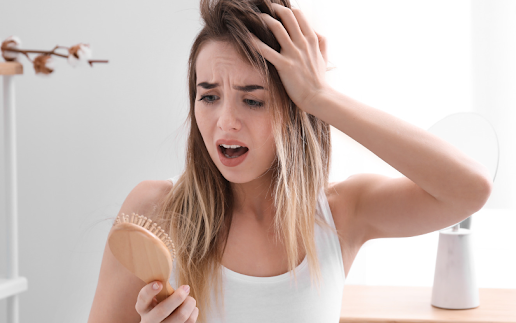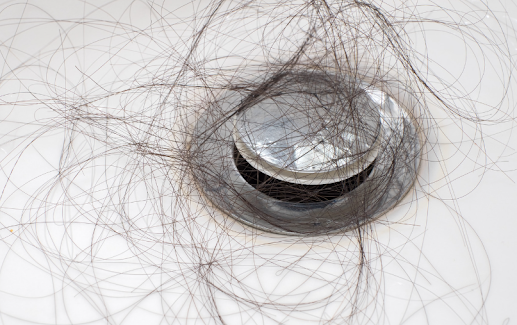How To Reverse Hair Loss
What are the best ways to stop hair loss in men and women?
Losing your hair is one of the worst things anyone can go through in life. Let's face it, no one wants to go bald, and we'd all much rather have hair than not.The problem is, life isn't particularly that kind, at times, and unfortunately for most of us, men and women, hair loss is an inevitability.
Research shows that over 65% of men, and 50% of women, suffer from some form of hair loss by the age of 40. The truth is, hair loss will effect nearly all of at some stage of our lives, and once it starts, it's incredibly difficult to stop.
There are many different types of hair loss, and thankfully, many of them are just temporary. Common hair loss conditions like postpartum thinning, menopausal baldness, and seasonal shedding, are all phases of hair loss, and once the phase has passed, most of the hair grows back to its normal state.
Research shows that over 65% of men, and 50% of women, suffer from some form of hair loss by the age of 40. The truth is, hair loss will effect nearly all of at some stage of our lives, and once it starts, it's incredibly difficult to stop.
There are many different types of hair loss, and thankfully, many of them are just temporary. Common hair loss conditions like postpartum thinning, menopausal baldness, and seasonal shedding, are all phases of hair loss, and once the phase has passed, most of the hair grows back to its normal state.
However, for the most common hair loss type in both men and women, which is androgenic alopecia (more commonly known as male or female pattern baldness), it's a long term, progressive issue that doesn't just go away.
What makes matters worse is that there isn't a cure for hair loss of any type, and it doesn't look likely that there will be any cure in the near future.
Fear not, though, because not all is lost. Despite there not being an out-and-out cure for baldness, there are still some treatments that have shown to help with hair loss prevention, and hair growth promotion.
It's just a matter of finding the treatments that work best for you, individually, and implementing them into a hair care plan that can help prevent further shedding, and promote the function of healthy hair growth.
Hair loss prevention is not a cure, but it's without doubt the nest best thing, so, realistically, this should be your target moving forward...
Top tips and treatments that will help you stop hair loss...
Stopping hair loss is no easy task, but there are some treatments and practices that have shown to be highly effective in stumping hair fall, and stimulating hair growth.
Millions of men and women are using these treatments and practices to great effect, and there's no reason why you can't take advantage of these things, too.
So, for better, fuller hair, lets get stuck in...
Tackle Hair Loss Early
The most important thing to do when treating hair loss is to tackle the issue as early as possible. As soon as you start noticing your hair thinning, it is crucial that you do something about it.
It's no coincidence that hair loss suffers who tackled the problem early saw better results in their hair. Remember, your realistic goal is hair loss prevention, so it's a matter of stopping further loss and maintaining the hair you have, long term.
Live a Healthy Lifestyle
This may seem like an obvious one, but you'd be surprised at how many people underestimate how good a healthy lifestyle is your your hair.Your hair is actually no different to any other part of your body - if you look after it properly, then it will thrive. Living an active lifestyle and eating good foods, will only benefit your hair. Eat lots of high-protein foods, and drink plenty of water. Research shows that people with better diets usually have stronger strands.
Avoid Medication Treatments
If you are experiencing very early stages of androgenic alopecia (pattern baldness) then be sure to stay away from medical treatments like minoxidil and finasteride. These types of treatments should be your last result, if all else fails.
Minoxidil (most commonly under the brand name, Regaine/Rogaine) can cause excessive hair shedding during its early use, which is not something that you will want, particularly as your hair loss is still in its infant stage.
Finasteride (commonly branded as Propecia or Proscar) comes with the risks of negative side-effects, some of which can have serious, long-term effects, so it's best to avoid it and seek safer alternatives, where possible.
Take Your Vitamins
Most of us can't get all the essential hair nutrients and minerals into our bodies every day, and that is where multi-vitamin hair supplements come into play. Popular hair growth supplements, like HR23+ and PharmaH41, can give your body all the right minerals and extracts it needs for your hair to grow.
These supplements have been shown to be hugely effective in preventing the effects of shedding and promoting healthy hair growth in men and women suffering from early stages of baldness and thinning hair.
What's more, they're safe, with zero negative side-effects, which means you can tackle hair loss without ever needing to compromise on your health and wellbeing.
Try Micro Needling
One of the more recent trends for treating hair loss is micro needling. While used as an anti-aging skin treatment, micro needling may also be a method of treatment for hair loss.There's even evidence that it can help a special type of hair loss known as alopecia areata. The same process of creating wounds in the skin is also thought to regenerate the health of the hair follicles.
To micro needle at home, simply purchase a derma roller or derma stamp (they are widely available for under £10), and start rollering your scalp no more than twice a week. This practice has shown to be particularly effective when done using Keratinocyte Growth Factor (KGF) Serum. Some users even reported hair regrowth.
Stop Worrying
Stress can play a huge factor in hair loss, which is why it's important that you do not stress about the issue. If you find it hard to destress, or if you are someone who tends to stress a lot by nature, then try to find ways to lower your stress levels.
Popular and effective ways of destressing include yoga, meditation, walks, and listening to upbeat music. It's not easy to lower stress levels, but the less you stress, then less amount of hair you will lose unnecessarily.
Ad.

















Post a Comment